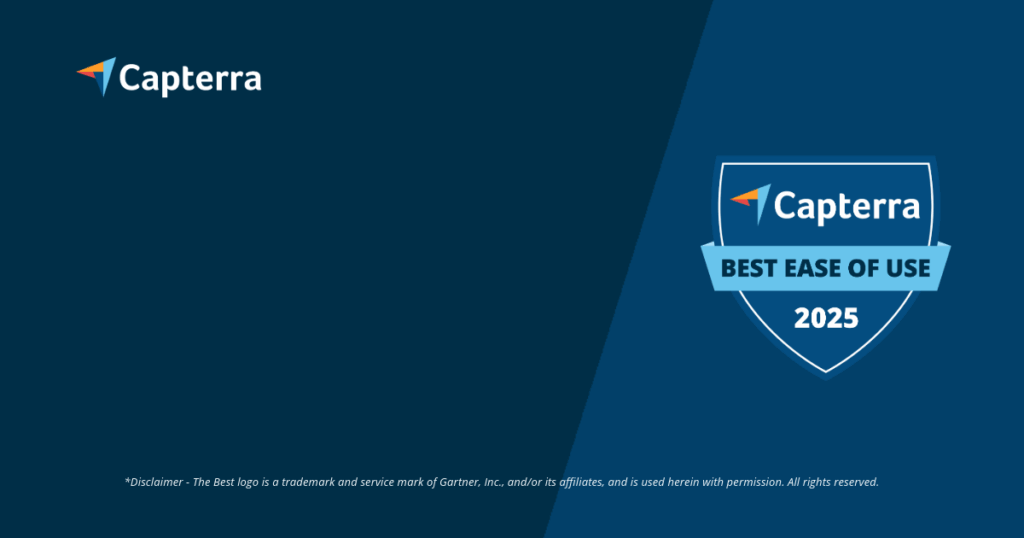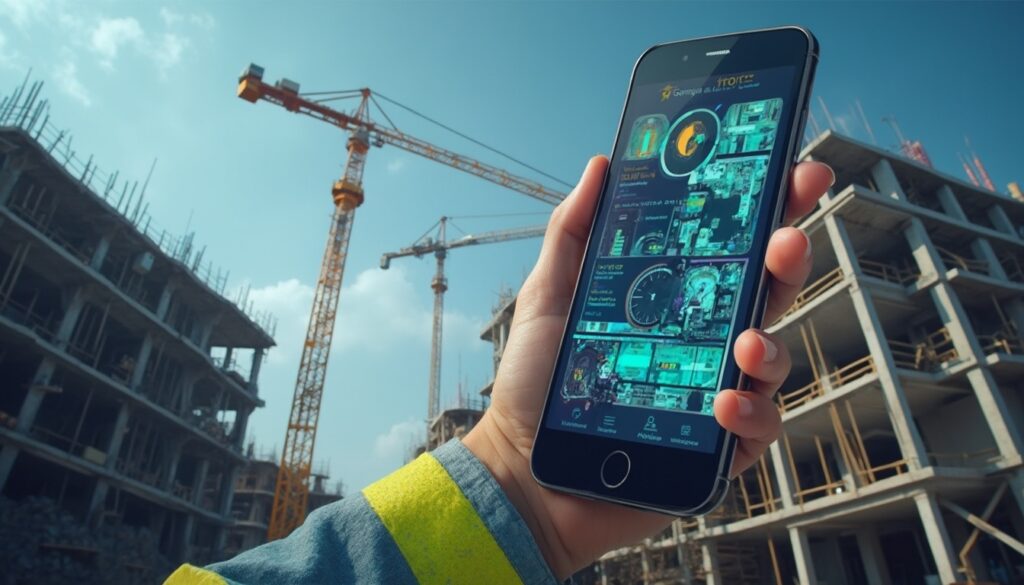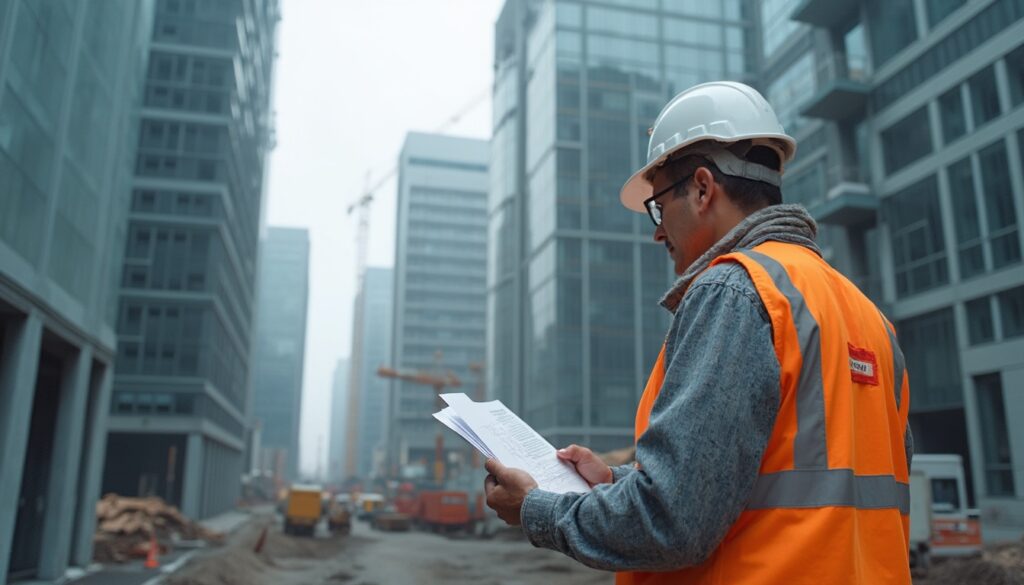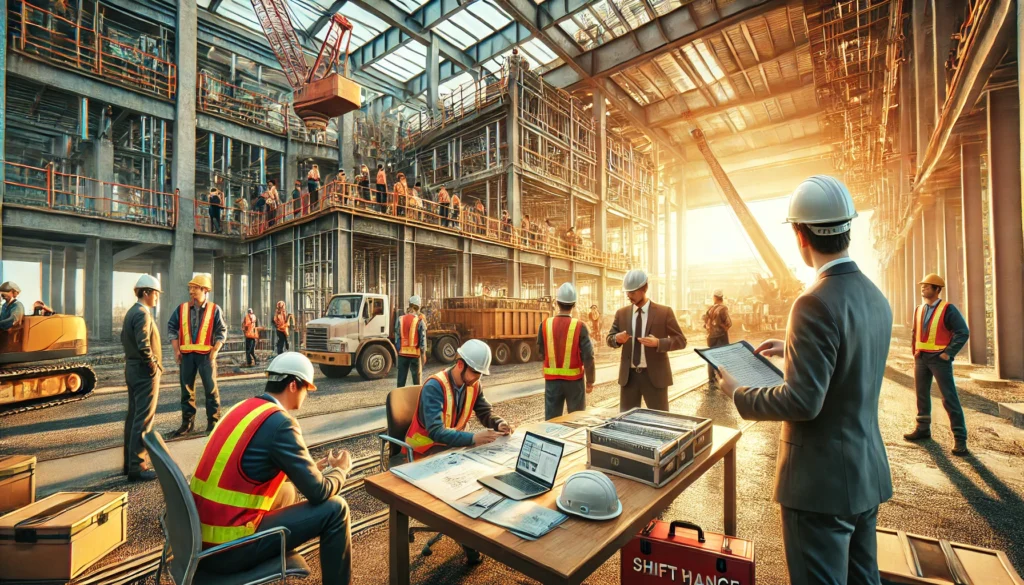Current market situation: Numbers and facts about the construction economy 2024
The construction sector in Germany recorded a turnover of approximately 48.6 billion euros in the first half of 2024. This represents a real, i.e., price-adjusted, decline of 2.2% compared to the previous year. For the entire year, the Central Association of the German Construction Industry (ZDB) forecasts a decrease of 3%.
However, these figures conceal a profound division in the market. While some segments are struggling, others are showing surprising resilience. Price pressure is easing, bringing the real decline closer to the nominal value. While the price increase for construction services was still at 7% at the end of 2023, it has now dropped to about 1%. This indicates an increasing competition for fewer orders, putting pressure on companies’ margins.
The uncertain situation leads to low investment willingness, which according to DIHK is clearly below the long-term average with a balance of minus 23 points. For construction companies, it is therefore crucial now to actively shape the future of the construction industry , instead of just reacting. The focus must be on optimizing internal processes to ensure profitability.
Residential construction in crisis: Collapse of building permits and orders
Residential construction is the troubled child of the German construction industry. Order intake decreased nominally by 12.6% in the first half of 2024. Revenue even plummeted by 12% in the same period, reaching only 10.75 billion euros. This development is a direct result of the declining building permits over the past 26 months.
The government’s target of 400,000 new apartments per year is clearly missed; for 2024, only 250,000 to 255,000 completions are expected. The reasons for this negative Order situation in the construction industry 2024 are varied:
- High financing costs due to rising interest rates.
- Persistently high construction costs for materials and energy.
- Lengthy and bureaucratic approval processes.
- Insecurity among private investors and builders.
Especially dramatic is the decline in single-family and two-family homes with over 22% and 12% fewer permits respectively. These figures show that a quick recovery is unlikely. Companies that are heavily dependent on residential construction urgently need to explore new business areas, such as renovation and modernization.
Stability anchors: civil engineering and public construction
In contrast to residential construction, civil engineering and public construction are proving to be pillars of the economy. Revenue in public construction grew by 4.0% to 16.2 billion euros in the first half of 2024. Order intake even increased by a total of 6%, driven by a 7% rise in civil engineering.
The commercial construction sector also shows resilience with a slight revenue increase of 1.7% to 21.6 billion euros. The main drivers are infrastructure projects as part of the energy and mobility transition, as well as the construction of logistics and warehouse buildings. Investments in the rail network, power lines, and broadband expansion ensure reliable demand. These projects are less susceptible to short-term interest rate fluctuations and offer a more stable planning basis.
For construction companies, this development presents a clear opportunity. A strategic focus on public tenders and projects in civil engineering can minimize risks in the construction industry. Specializing in these growing segments can secure utilization and reduce reliance on the ailing residential construction sector.
The biggest hurdles: skilled labor shortages and bureaucracy
Despite a stable order situation in some sectors, the entire industry is struggling with structural problems. The shortage of skilled workers in the construction industry remains the biggest challenge. According to a DIHK survey, 65% of all construction companies see this as a business risk, and in civil engineering, it’s even 74%.
At the same time, high bureaucratic requirements burden companies and delay projects. Efficient processes are therefore not a luxury but a necessity. The projected reduction of 30,000 jobs in 2024 further intensifies the pressure on the remaining teams. Every hour saved through optimized processes is a direct profit for the company.
Here are some of the biggest efficiency barriers in construction day-to-day:
- Unstructured communication via private WhatsApp groups.
- Missing or incomplete construction documentation.
- High manual effort for creating construction site reports.
- Language barriers in international teams.
These problems lead to mistakes, delays, and legal risks. A thoughtful digitalization of the construction industry addresses these points to increase productivity.
Solution through efficiency: How digital tools simplify everyday construction
In a market characterized by cost pressure and skilled labor shortages, efficiency becomes the critical competitive advantage. The solution lies not in even more complex software, but in simple, practical tools. Valoon addresses this directly by transforming the already established communication via WhatsApp into a legally secure and structured process.
Imagine your site workers documenting progress, reporting defects, or logging their hours simply through voice messages or photos. This information is automatically translated, transcribed, and allocated to the correct project. The result is a seamless, proof-secure documentation without additional effort for your team.
The benefits are immediately noticeable: you reduce communication chaos, minimize errors, and save valuable time daily when creating construction site reports. A study by McKinsey predicts that by 2025, every second construction company will rely on digital solutions. With Valoon, you become part of this development – without training efforts and with a solution that is completely free on site.
Outlook: Sustainability and AI as drivers of the future
In addition to digitalization, two other megatrends are shaping the trends in the construction industry: sustainability and artificial intelligence. New EU regulations and ESG criteria force companies to consider the entire lifecycle of a building. This requires precise documentation of materials and processes, making digital tools essential.
At the same time, artificial intelligence is making its way into the construction industry. It assists in automating routine tasks, such as analyzing photos or creating reports. Valoon is already using AI today to convert voice messages into text and translate in real-time. This overcomes language barriers and ensures that all information is accurately recorded. künstliche Intelligenz in der Baubranche Einzug. Sie hilft bei der Automatisierung von Routineaufgaben, wie der Auswertung von Fotos oder der Erstellung von Berichten. Valoon nutzt KI bereits heute, um Sprachnachrichten in Text umzuwandeln und live zu übersetzen. Dies überwindet Sprachbarrieren und stellt sicher, dass alle Informationen korrekt erfasst werden.
Companies that now rely on simple digital solutions are laying the foundation for future innovations. They not only become more efficient today but also fit for the demands of tomorrow, whether in the area of the sustainable construction industry or in integrating further AI applications. The course for future success is being set now.
Conclusion: Your advantage with Valoon
The development of the construction industry in 2024 poses high demands on the flexibility and efficiency of companies. The crisis in the residential construction requires a realignment, while the skilled labor shortage demands optimal use of existing resources. The key to success lies in simplifying and digitalizing core processes.
Valoon offers you exactly that: a straightforward solution that is immediately accepted on site because it is based on WhatsApp. You create legal certainty through seamless documentation, achieve enormous time savings through automated reports, and benefit from maximum simplicity without training effort. Navigate your company safely through the current market situation.
Integrate a solution specifically developed for the challenges of the construction industry. Secure your margins and relieve your staff in the office and on site. Take the first step towards more efficient construction projects.
More Links
Der Central Association of the German Construction Industry (ZDB) provides current news and forecasts on the construction economy for the years 2024 and 2025.
Das Federal Statistical Office (Destatis) provides a press release from February 2025 containing relevant statistical data on the construction industry.
Das ifo Institute analyzes in an article the European construction economy and its dynamics losses in 2024.
Roland Berger publishes a publication that outlines how the construction industry could adapt to a ‘new normal.’
Die Initiative ‘Germany Digital’ provides comprehensive information on the digitalization index for Germany.
Der Main Association of the German Construction Industry provides detailed figures, facts, and forecasts on the current construction economy.
Die KfW offers the KfW Municipal Panel 2025 as a detailed PDF document with insights into the municipal financial situation.
Die Deutsche Bundesbank publishes its monthly report from February 2025, focusing on the economy in Germany.
FAQ
How does Valoon help my construction company in the current market situation?
Valoon increases your efficiency by automating communication and documentation via WhatsApp. You save time in report generation, create legal certainty, and reduce errors without your employees needing to learn a new app. This secures your margin in a competitive environment.
Is the documentation with Valoon legally secure?
Yes, all messages, photos, and documents sent via Valoon are stored unalterably and timestamped on German servers. This ensures seamless and proof-secure documentation that meets the requirements of the VOB/B and BGB.
Are there any costs for my employees on site?
No, the use of Valoon is completely free for on-site employees. They continue to use WhatsApp as usual. Costs are only incurred for users of the office software, who benefit from the structured data and automated reports.
How does live translation work at Valoon?
When an employee sends a voice message in their native language, our AI automatically transcribes it and translates it into the recipient’s target language. This overcomes language barriers in real-time and ensures clear instructions and error-free communication.
How quickly can I start with Valoon?
Getting started with Valoon is possible within minutes. Since it does not require app installation or training for on-site employees, you can immediately begin improving your project efficiency from day one. Book a free demo and see for yourself.








